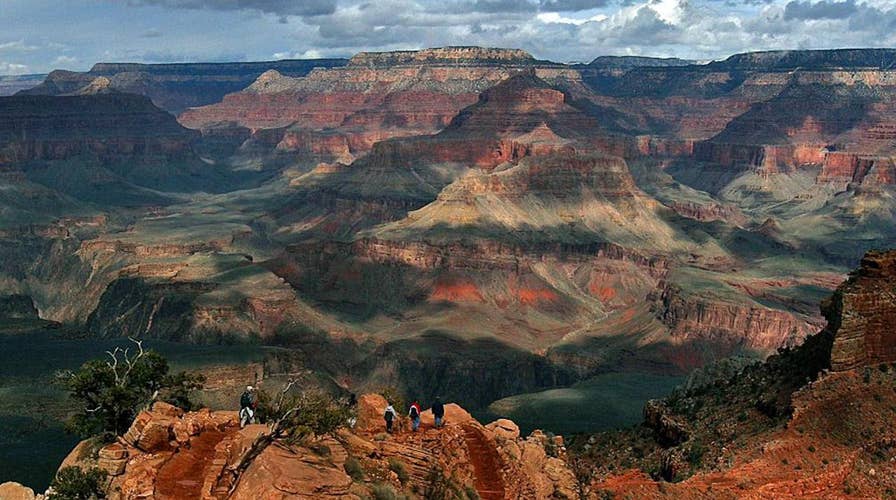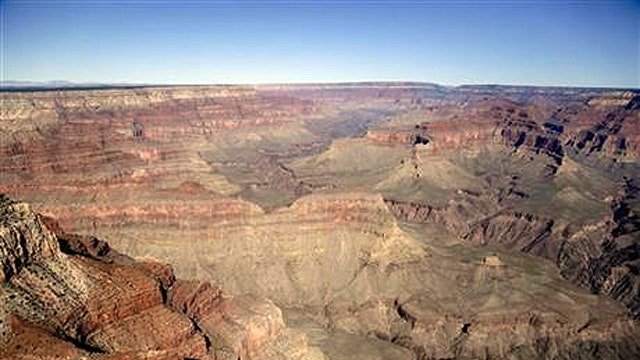Conservationists unhappy with Trump's proposed change to a 50-year-old environmental law
The Trump administration says a proposed change to the National Environmental Policy Act will make it easier to put in new infrastructure while critics say it will have a devastating impact on the environment.
The Big Idea is a series that asks top lawmakers and figures to discuss their moonshot — what’s the one proposal, if politics and polls and even price tag were not an issue, they’d implement to change the country for the better?
Last year, Sens. Tom Udall, D-N.M., and Michael Bennet, D-Colo., introduced legislation in the upper chamber of Congress to drastically expand the amount of federally protected land over the next decade.
Called the “Thirty by Thirty Resolution,” the push by the two Western Democrats would add conservation protections to at least 30% of undeveloped land and 30% of the ocean within U.S. territory by 2030.
DEBBIE DINGELL'S BIG IDEA: SHAKE UP THE PRIMARY CALENDAR
Now, with millions of Americans out of work and the coronavirus pandemic raging across the country, Udall says it is the time to start implementing his goal. Calling conservation a “job creator,” Udall argues that by expanding the amount of public lands and fostering jobs in areas such as green energy, the country can tackle the economic freefall and the threat posed by climate change.
Udall discussed his idea and how he sees it benefitting the country with Fox News:
Q: What is your big idea?
Udall: The world is facing two dual, existential crises: the climate crisis, and a rapidly accelerating nature crisis. Americans can’t afford to wait to act on these crises, and we can’t limit ourselves to small ideas. We’re in the middle of a sixth mass extinction with one million species threatened because of human activity. We are losing a football field’s worth of nature every 30 seconds in the U.S. And let’s be clear: human survival depends on the natural ecosystems around us — for clean air and water, medicine, outdoor recreation, energy, food, economic growth, and more. Scientists tell us we need to protect 30% of our lands and waters by 2030 to save nature. That’s why I’ve introduced a resolution in the Senate to do just that — to set a national goal to restore and preserve our nation’s outdoor spaces and waters, and to reestablish the United States’ leadership role in conservation.
Q: How can this help the economy recover from the COVID-19 pandemic?
Udall: I can’t emphasize this enough: Conservation and environmental protection can play a critical role in our economic recovery. Conservation is a job creator, plain and simple, and it’s one of the best ways we can put people back to work. It’s a win-win. Expanding and maintaining our public lands and tackling climate change can help fuel the economy and create tens of thousands of sustainable, good-paying jobs especially in our rural communities. Before the onset of this crisis, outdoor recreation was fueling some of the greatest job growth in New Mexico, and across the nation, particularly in our rural communities. Last year, the outdoor recreation economy was responsible for an estimated $900 million in economic activity and millions of jobs nationwide. Conserving and expanding recreation opportunities in our treasured public lands and waters will be key to restarting this important part of our economy. Instead of being a source of pollution, public lands can be part of the solution that help us vastly reduce our greenhouse gas emissions. And as we transition toward clean energy, we must support and protect communities, Tribes, and states that have relied on fossil fuels. Transitioning to a clean energy economy is for everyone, and no one can be left out.
Q: How intertwined is the climate crisis with the pandemic and the struggling economy?
Udall: There is certainly a connection between the climate crisis, the rapid loss of nature and the COVID-19 pandemic that is causing economic devastation across the country. Coronavirus is a zoonotic disease, transmitted from animals to humans. As humans destroy habitat, we come into closer contact with animals and increase the opportunities for zoonotic disease. Scientists tell us COVID is just the tip of the pandemic iceberg if we continue to destroy habitats and illegally traffic wildlife.
Climate change also has huge direct costs to the economy such as increased damage from drought, forest fires, and more powerful storms. Addressing climate change pollution, whether through renewable energy or through natural carbon sequestration from a plan like 30x30, saves money. These solutions also create jobs all over the U.S. and plenty in rural America where our economy is hurting the most.
FOX BUSINESS: EPA TO RESCIND METHANE REGULATIONS FOR OIL AND GAS
Protecting, preserving and restoring our public lands presents a great opportunity for making gains on our overall climate goals and preventing the spread of future zoonotic diseases. The accelerating climate crisis is destroying habitats and ecosystems. And as habitats and ecosystems are destroyed, the planet is losing its life support system and ability to absorb and capture the carbon that continues to warm our atmosphere. Addressing the climate crisis will involve not just creating a green economy, but also reevaluating how we support and maintain our public lands. Instead of prioritizing the extraction of fossil fuels from every inch of our public lands that belong to the American people, we must recognize that our collective future is tied to the preservation of the natural land. Public lands can lead the way in becoming part of the solution instead of a source of pollution.
Q: How would this positively affect environmental justice communities?
Udall: The fact is that communities of color and low-income communities have long endured the worst effects of toxic pollution and environmental destruction, even though these communities aren’t overwhelmingly responsible for producing such pollution. This form of environmental injustice is one of the factors that causes health disparities — and it’s one of the reasons why COVID-19 is disproportionately killing Black, Hispanic, and Native people. I absolutely believe that environmental justice and racial justice go hand-in-hand. That’s the only way we’ll achieve equitable and lasting change.
Adopting the 30x30 approach would mean that instead of propping up industries that pollute our communities, create few and often short-term local jobs, and leave behind toxic waste that taxpayers then pay to clean up, we would invest in restoring and protecting land that can become urban green space or new national parks. As a result, we’d open up nature to more people, and thereby create millions of good jobs in outdoor recreation and clean energy development, making all of our communities stronger and healthier.
The research shows that when kids don’t have firsthand exposure to nature and the outdoors, their physical and mental health and overall development suffer. It’s precisely kids with lesser means who need the access to nature 30x30 can provide.
Q: Do you have any particular areas of the country that you currently want included in this plan?
Udall: I like to say: Protect the Best and Restore the Rest. Protecting and restoring 30% of our lands and waters is an ambitious goal, and it will involve a diversity of efforts including creating new national monuments and parks, designating new wilderness areas, creating more urban green spaces, and returning federal lands to a healthier state. It’s a national goal, but the individual pieces come best from state and local grassroots efforts — it is not a one-size-fits-all approach. To get there, we are talking about everything from iconic national landscapes to the local park just down the street; 30x30 is a way of saying we need the services of nature to survive. Trees on your block help clean the air just like trees in national forests. And we can’t get to 30% with just federal lands—we need to expand programs and incentives for voluntary private land conservation and restoration as well.”
28T TONS OF ICE LOST IN 23 YEARS, STUDY SAYS
Q: Given the partisan nature of Congress – and Washington in general – do you expect this legislation to pass?
Udall: This should be a bipartisan initiative. Polls show strong bipartisan consensus around conserving the great outdoors. Whether you’re a Republican, a Democrat or an independent, you rely on nature and you probably love it, too. One poll found that 86% of people would support a 30x30 target, and that included over 70% of Republicans. We just passed major, bipartisan legislation to fully fund the Land and Water Conservation Fund, and meanwhile, my wildlife corridor legislation is bipartisan, and my reforestation legislation is bipartisan. I think momentum and public opinion are on our side, and I actually believe that conservation is an area where we can work together.
Q: What are the biggest hurdles in passing legislation like this?
Udall: The biggest hurdle to moving forward on a 30x30 goal is a broken political system that isn’t answering to the wishes of the American people, but rather to moneyed, special interests and big corporations. Because we know that Americans, especially Americans in the West, overwhelmingly support this type of proposal — they have a deep appreciation of our natural heritage and understand the value of outdoor recreation, clean air and water and the preservation of our most special outdoor spaces. We just need our policymakers and leaders to listen to the people they represent.
To those who say bold conservation measures "cost too much": a recent study by over 100 economists found that every dollar invested into 30x30 would yield five dollars in return. The costs of inaction are far greater than the comparatively small investment of 30x30. Communities across the country are already experiencing costly and deadly natural crises every day: increasing wildfires, droughts, and destructive storms, marine and terrestrial ecosystems that are no longer able to support once-thriving agricultural economies, and needless pollution from fossil fuel and mining companies in American’s backyards. Protecting nature is also key to our economic recovery from the COVID-19 pandemic, creating direct jobs and fueling the fast-growing outdoor industry. We shouldn’t concede that environmental protection is an economic loser like industry wants us to think. Outdoor recreation is a thriving industry. And we won’t be able to subsist on fossil fuels forever.
CLICK HERE FOR THE FOX NEWS APP
Q: How do you convince your colleagues to take the threat of global climate change seriously and make progress before it is too late?
Udall: It is not too late to make serious gains on the climate and nature crisis — and I am optimistic because of the vast public support for the type of bold action that is needed. The differences between the planet warming 1.5 degrees, 2 degrees, or more are hugely significant. It’s not an "either-or" question, so any significant action will pay huge dividends. When it comes to the nature side of the climate question, Americans treasure our nation’s public lands and want to see them protected and maintained. They recognize that the goal of protecting 30% of our lands and waters by 2030 is fundamental to creating a livable and productive planet for future generations. Protecting nature is also key to our economic recovery from the COVID-19 pandemic, creating direct jobs and fueling the outdoor industry.
Bottom line, the president reversed course and suddenly championed the Land and Water Conservation Fund because that’s where the votes are. There is enormous public support behind these efforts. Lawmakers on both sides of the aisle must listen to Americans who value the spectacular natural beauty of our country– it’s our heritage – and who support these measures to help preserve public lands for future generations to come.

















































